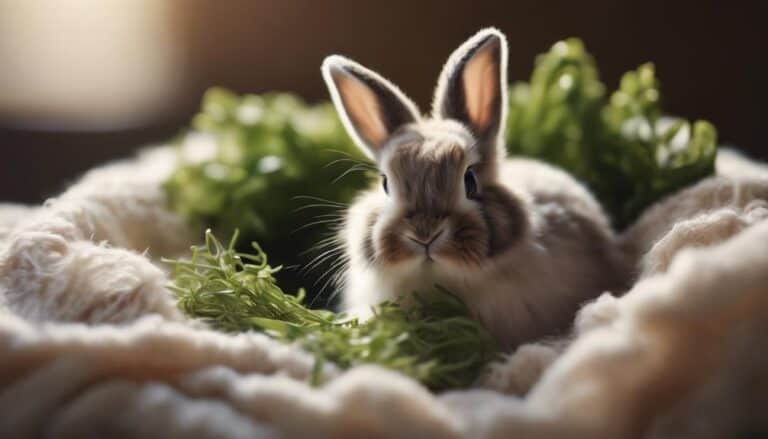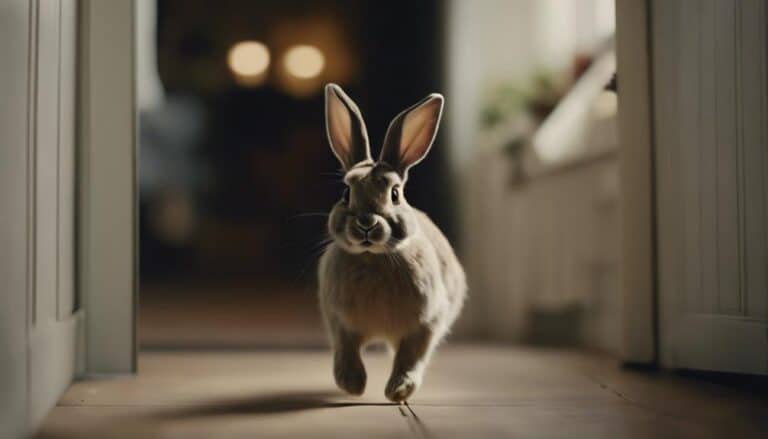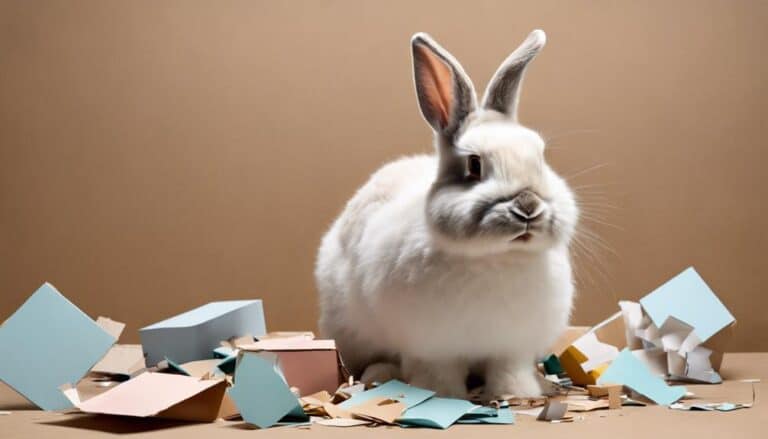Thinking about getting a pet rabbit? Before you bring one home, there are some important things to consider.
For starters, you'll need to make sure your home is rabbit-friendly. This means setting up a safe and comfortable space for your new pet, complete with hiding places, toys, and plenty of room to hop around.
You'll also need to rabbit-proof your home, as these curious creatures love to chew and dig.
Rabbits also have some unique behaviors you should be aware of. For example, they're crepuscular, meaning they're most active at dawn and dusk.
They're also social animals and need plenty of attention and interaction from their owners.
Owning a rabbit requires a lot of dedication and responsibility. You'll need to commit to regular cleaning of their cage, providing a balanced diet, and taking them to regular vet check-ups.
But if you're willing to put in the work, having a pet rabbit can be incredibly rewarding. They're gentle, affectionate, and can even be litter-trained!
So, is a pet rabbit right for you? It's a big decision, but with the right mindset and preparation, it can be a wonderful choice.
Contents
- 1 Key Takeaways
- 2 Rabbit Care Essentials
- 3 Understanding Rabbit Behavior
- 4 Rabbit Diet and Nutrition
- 5 Creating a Safe Rabbit Environment
- 6 Handling and Bonding With Rabbits
- 7 Exercise Needs for Rabbits
- 8 Protecting Rabbits From Predators
- 9 Common Health Issues in Rabbits
- 10 Considering a Rabbit as a Pet
- 11 Conclusion
Key Takeaways
So, you're thinking of getting a pet rabbit? That's awesome! But before you bring one home, there are a few things you should know.
First of all, rabbits are social pets, which means they need daily interaction. They love attention, so be prepared to spend some quality time with your new furry friend.
When it comes to food, rabbits need a proper diet that includes hay, veggies, and pellets. Don't worry, it's not complicated – just make sure to provide a variety of healthy foods to keep your rabbit happy and healthy.
Your rabbit will also need a safe and spacious enclosure where they can exercise and play. It's essential to provide enough room for them to move around, stretch, and be their adorable selves.
Regular veterinary care is also crucial for your rabbit's health. You'll need to schedule regular check-ups to ensure your pet stays healthy and thriving.
Finally, owning a rabbit is a long-term commitment. Rabbits can live for up to 8-10 years, so make sure you're ready to provide a forever home for your new pet.
Rabbit Care Essentials
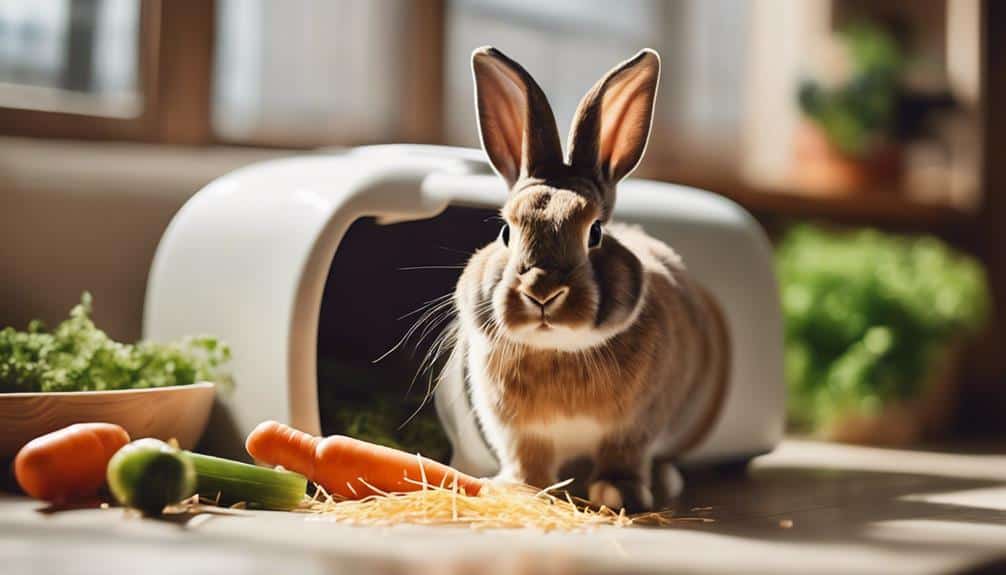
Rabbit care involves several key considerations.
Your pet rabbit needs a spacious enclosure to move around and exercise. The minimum size should be 2x4x4 feet, but the bigger the better. This will ensure your rabbit's comfort and overall well-being.
A balanced diet is crucial, consisting of 80% hay, 10% veggies, and 10% pellets. Unlimited access to fresh hay and water is also essential for their health.
Regular veterinary check-ups are a must, scheduled every 6-12 months to catch any potential health issues early on. This will help prevent and detect problems before they become serious.
Litter training is another important aspect of rabbit care, requiring a suitable litter box and daily cleaning to keep the living space clean and prevent health problems.
Daily social interaction and mental stimulation are vital for your rabbit's well-being, achieved through playtime, toys, and environmental enrichment to keep them entertained and prevent boredom and stress.
Understanding Rabbit Behavior
To give your pet rabbit the best possible care, you need to understand their behavior. This includes how they communicate, their social needs, and how they show affection.
Rabbits are social animals, so they need to interact with you and other rabbits regularly to be happy and healthy.
If you don't understand their body language, you might miss important cues. For example, if your rabbit is thumping or hiding, it's likely they're feeling stressed or scared.
By recognizing these signs, you can create a stress-free environment for them.
Rabbits need attention and socialization every day. If they don't get it, they can get bored and lonely, which can lead to behavioral problems.
On the other hand, if you spend quality time with your rabbit, they'll show you affection in their own special ways, like licking and nuzzling.
It's also important to remember that rabbits are prey animals, so they need to feel safe and secure.
Rabbit Diet and Nutrition
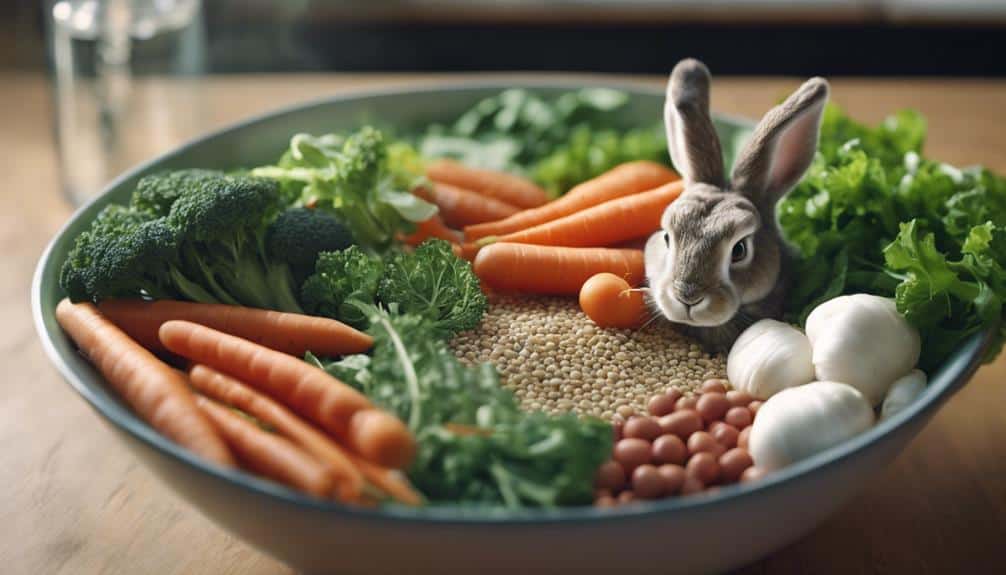
Rabbits are herbivores, which means they only eat plants. 80% of their daily food should be hay! Specifically, Timothy hay is great for them because it helps keep their teeth trimmed and their digestive system running smoothly.
In addition to all that hay, you should also give them some fresh veggies – about 15% of their daily food. Fresh veggies, not frozen or canned, are best. Introduce them gradually so you don't upset their tummies. Some good options are dark leafy greens like kale and spinach, but don't overdo it. About 1/4 cup per pound of body weight daily is a good rule of thumb.
And finally, about 5% of their diet should be pellets. These are like a special kind of rabbit food that's got all the nutrients they need. When it comes to food, rabbits are kind of picky. They don't do well with sugary, fatty, or high-protein foods like dried fruits, nuts, and seeds. Those can lead to obesity and other health problems. So, stick to the hay, veggies, and pellets, and your rabbit will be happy and healthy!
Creating a Safe Rabbit Environment
So, you want to create a safe environment for your pet rabbit.
First things first, you'll need to rabbit-proof your indoor spaces. This means preventing chewing and other potential hazards that could harm your rabbit.
Designing a safe outdoor enclosure is also crucial. Your rabbit needs ample space to move around and protection from predators.
Rabbit-Proofing Indoor Spaces
So you want to make sure your pet rabbit is safe and happy indoors.
First, get rid of anything that could harm your rabbit. This means removing electrical cords, toxic substances, and fragile items that could break easily. You don't want your rabbit to get hurt or ingest something bad for them.
Next, secure any loose items that could fall over or get chewed up. This includes books, decorations, and furniture. You can use straps or weights to keep them in place. This will prevent accidents and damage to your belongings.
You'll also want to block off areas you don't want your rabbit to access. Use baby gates or pet barriers to keep them out of certain rooms or areas. This will keep them safe and prevent them from getting into trouble.
To protect your furniture and surfaces, cover them with rabbit-safe materials like wood or cardboard. And don't forget to provide plenty of chew toys to keep your rabbit occupied. This will save your belongings and keep your rabbit happy.
Safe Outdoor Enclosure Design
Designing a safe outdoor enclosure for your pet rabbit is crucial for their well-being and security. To get it right, you need to consider some key factors.
First, the enclosure needs to be spacious enough for your rabbit to roam and exercise. A good rule of thumb is to provide at least 2-4 square meters of floor space per rabbit, with a minimum height of 2 meters to allow for jumping and stretching.
To prevent escape, the enclosure must be escape-proof. This means the fencing should extend at least 3 feet below ground level to prevent digging, and the roof or top should be sturdy enough to prevent climbing and predation.
When it comes to building the enclosure, you'll want to use waterproof and weather-resistant materials like wood or metal for the frame. For the walls and roof, opt for durable and predator-resistant mesh like chicken wire or hardware cloth. This will help keep your rabbits safe from predators.
But safety isn't the only consideration. You'll also want to make sure your rabbits have hiding places, shade, and protection from the elements, along with proper ventilation. And don't forget to clean the enclosure regularly, and provide fresh water, hay, and food to keep your rabbits healthy and happy.
The key to a safe outdoor enclosure is designing it with safety features that prevent escape and predation. By following these guidelines, you can create a secure and enjoyable outdoor space for your pet rabbit.
Potential Household Hazards
To guarantee a safe environment for your pet rabbit, it's essential to be aware of potential household hazards that could pose a risk to their well-being. Rabbits love to chew, so you'll want to take some precautions to keep them safe.
First, consider that rabbits like to chew on things they shouldn't, like electrical cords. So, make sure to secure all cords and keep them out of reach. You can cover them with cord concealers or PVC tubing to prevent electrocution.
You'll also want to keep toxic substances away from your rabbit. Store cleaning supplies, chemicals, and medications in secure cabinets where your rabbit can't get to them.
Rabbits can also get stuck in small spaces, so make sure to block off any holes or gaps where they could get trapped. Secure heavy furniture and appliances to prevent tipping accidents.
Handling and Bonding With Rabbits
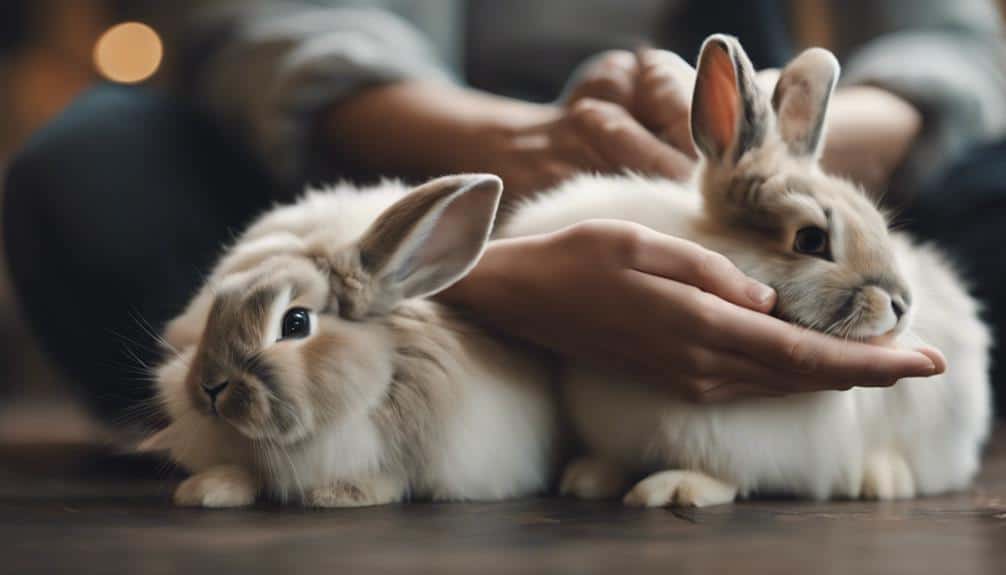
When you're handling your pet rabbit, try to approach them calmly and confidently. You don't want to startle them. Rabbits are prey animals, so they can be easily spooked.
Building trust with your rabbit is key. You can do this by having gentle interactions with them and using positive reinforcement. This is vital for developing a strong bond between you and your rabbit.
Proper Rabbit Handling
Properly handling and bonding with your pet rabbit is essential for fostering a trusting and enjoyable relationship with your furry companion.
When it comes to handling your rabbit, remember to lift them gently but securely. You want to support their body to prevent injuries or stress.
It's also crucial to start handling your rabbit early on, so they get comfortable with human contact. This can help reduce behavioral issues down the line.
When approaching your rabbit, move slowly and calmly. Avoid sudden movements, and never lift them by their ears or legs.
Rabbits show love in their own way, so it's essential to recognize their affection signals. They might lick, nuzzle, or give you gentle nips to show they care.
Building Trust With Rabbits
Building trust with your rabbit is all about gentle and consistent handling. This helps them feel secure and builds a positive association with human interaction.
When you're handling your rabbit, start with short sessions and gradually increase the time as they become more comfortable. Move slowly around them and avoid sudden movements or loud noises, which can startle them. Let the rabbit approach you at their own pace – this helps them feel more in control and builds trust.
Offering treats during handling can also create a positive association with human touch. When you're handling your rabbit, make sure to support their body properly and lift them gently. This ensures their safety and comfort.
Importance of Bonding
Building a strong bond with your pet rabbit is all about establishing trust and fostering a positive relationship through consistent and gentle handling. Rabbits are social creatures that thrive on companionship, making them excellent companion animals.
When it comes to spending time with your rabbit, it's essential to do it daily. Allocate some time each day to interact with your rabbit, whether it's through petting, playing, or simply being present in the same room. This will help your rabbit get used to your presence and build trust.
Positive reinforcement is also crucial. When your rabbit exhibits desired behaviors, reward them with treats and gentle strokes. This will help them associate these behaviors with positive outcomes.
It's equally important to respect your rabbit's boundaries. Pay attention to their body language and cues to avoid overwhelming them with unwanted attention. If your rabbit seems stressed or wants to be left alone, give them space.
If you're considering getting another rabbit, having a bonded pair can be a great idea. Rabbits often form strong bonds with each other, and this can provide them with social interaction and companionship.
Lastly, don't forget about regular health check-ups. Keeping your rabbit healthy is vital for maintaining a strong bond. Schedule regular vet visits to monitor your rabbit's well-being. Bonding with your rabbit takes time and patience, but the rewards of a loving and trusting relationship are well worth the effort.
Exercise Needs for Rabbits
Exercise is crucial for your pet rabbit's overall health and well-being. They need at least four hours of exercise outside their hutch or cage every day to stay healthy and happy.
You'll want to create a safe exercise area that's rabbit-proofed, free from hazards, and has enough space for your rabbit to move around, stretch out, and engage in natural behaviors like jumping, running, and digging.
When you're setting up this exercise space, think about adding a variety of toys and obstacles like tunnels, boxes, and untreated wood toys to keep your rabbit mentally and physically stimulated. It's also a good idea to include different textures like grass, hay, and wood to keep them engaged.
Rabbits can get bored and develop behavioral problems if they don't get enough exercise and mental stimulation. So, it's important to rotate toys and activities regularly to keep them interested and healthy.
Protecting Rabbits From Predators
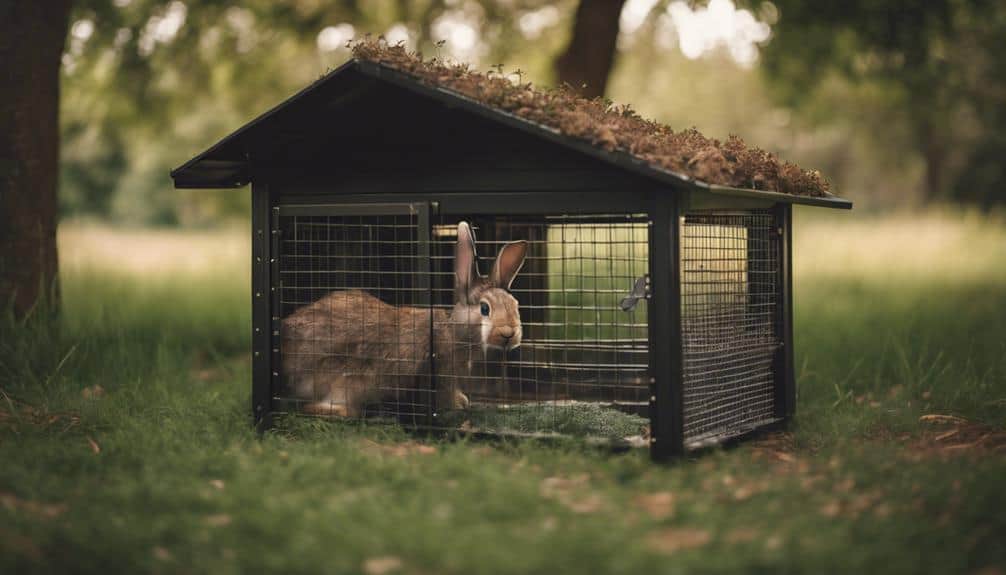
So you've got a pet rabbit, and you want to make sure it's safe from predators. That's smart, because rabbits are prey animals and they naturally fear predators like dogs and cats.
First things first, you need to make sure their enclosure is secure and escape-proof. You can do this by building a strong roof and walls. Then, cover the enclosure with chicken wire or hardware cloth to prevent predators from climbing or flying in.
Another important thing to do is keep the living space clean and free of food debris. This will reduce the attractiveness of the area to predators.
You might also want to consider using a motion-activated sprinkler or ultrasonic repellent device to deter predators from approaching.
If you have other pets, like cats or dogs, make sure to supervise their interactions with your rabbit. This will prevent any potential harm.
Common Health Issues in Rabbits
Rabbits can face a range of health issues that can affect their overall well-being and quality of life. Two of the most significant health concerns for rabbits are dental problems and gastrointestinal stasis.
Dental issues, for instance, can be a real problem. If their teeth grow too long, it can cause them a lot of pain and make eating difficult. This is why regular visits to a rabbit vet are so important. They can check the rabbit's teeth and catch any problems early on, preventing more serious complications from developing.
Gastrointestinal stasis, on the other hand, happens when food moves too slowly through the digestive system. This can cause symptoms like lethargy and loss of appetite. If you notice your rabbit is acting lethargic or has lost interest in food, it's essential to take them to the vet right away.
Here's a quick rundown of some common health issues in rabbits:
| Health Issue | Description |
|---|---|
| Dental Problems | Overgrown teeth can cause pain and difficulty eating, emphasizing the need for regular veterinary check-ups to prevent complications. |
| Gastrointestinal Stasis | Slow movement of food through the digestive system can result in symptoms like lethargy and abdominal pain.
Considering a Rabbit as a Pet
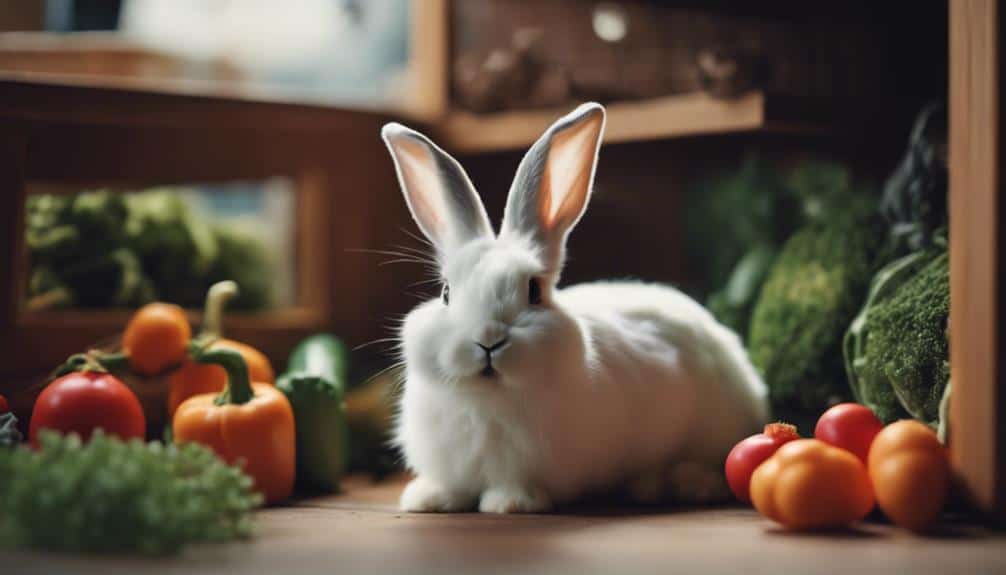
Considering a pet rabbit is a big decision that requires careful thought and preparation. Owning a rabbit is a long-term commitment that comes with a lot of responsibilities.
Rabbits make great companions. They're social animals that can form strong bonds with their owners. They love human interaction and can even recognize their owners' voices.
When it comes to their diet, make sure you give your rabbit a balanced meal plan. This should include hay, vegetables, and pellets to maintain good health. A healthy diet is crucial to prevent health problems and ensure your rabbit lives a long and happy life.
The environment you provide for your rabbit matters a lot. Rabbits need a safe and spacious living space with a large enclosure and a litter box to meet their needs. Make sure their living space is well-ventilated, clean, and free from hazards.
Rabbits are capable of needing medical care, just like any other pet. Be prepared for regular vet check-ups and potential medical expenses to keep your rabbit healthy. It's essential to have a plan in place for emergency vet visits and to budget for any unexpected medical bills.
Lastly, give your rabbit daily attention. Spend time interacting with your rabbit to prevent boredom and provide mental stimulation. Rabbits need exercise and mental stimulation to stay happy and healthy.
Conclusion
So you're thinking of getting a pet rabbit? That's a big decision! Having a rabbit as a pet requires a lot of responsibility and careful thought.
Think of it like tending to a delicate garden. If you give your rabbit the right care and attention, your bond will grow and flourish.
But it takes time, love, and some knowledge to make it work.
If you're willing to put in the effort, having a pet rabbit can be super rewarding.
You'll get to experience the joy and fulfillment that comes with having a furry friend by your side.



